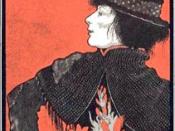Pygmalion - Higgins' Philosophy
Professor Higgins is seen throughout Pygmalion as a very rude man. While one may expect a well educated man, such as Higgins, to be a gentleman, he is far from it. Higgins believes that how you treat someone is not important, as long as you treat everyone equally. The great secret, Eliza, is not having bad manners or good manners or any other particular sort of manners, but having the same manner for all human souls: in short, behaving as if you were in Heaven, where there are no third-class carriages, and one soul is as good as another. -Higgins, Act V Pygmalion. Higgins presents this theory to Eliza, in hope of justifying his treatment of her. This theory would be fine IF Higgins himself lived by it. Henry Higgins, however, lives by a variety of variations of this philosophy. It is easily seen how Higgins follows this theory.
He is consistently rude towards Eliza, Mrs. Pearce, and his mother. His manner is the same to each of them, in accordance to his philosophy. However the Higgins we see at the parties and in good times with Pickering is well mannered. This apparent discrepancy between Higgins' actions and his word, may not exist, depending on the interpretation of this theory. There are two possible translations of Higgins' philosophy. It can be viewed as treating everyone the same all of the time or treating everyone equally at a particular time. It is obvious that Higgins does not treat everyone equally all of the time, as witnessed by his actions when he is in "one of his states" (as Mrs. Higgins' parlor maid calls it). The Higgins that we see in Mrs. Higgins' parlor is not the same Higgins we see at...


